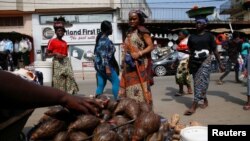Bleu has been breeding the molluscs and teaching others how to raise edible snails since 2017.
Throughout the country, several snail farms have joined the trade, said Bleu. Around 1,200 farms have started in recent years, and nearly 6,000 people have been trained in snail farming.
"The snail is by far the caviar today, it is a quite prized meat that cannot be compared to beef," according to the 42-year-old businessman.
Bleu said that five years ago, total snail consumption was at little over 7 tonnes, mostly picked from the forest.
"We used to collect them in the village, but now there is no more forest and we can't find them in the bush," Armand Eudest, a local resident, told Reuters at Adjame market in Abidjan.
Last year around 7 tonnes was picked from the forest, while producers provided 14 tons, for a total of 21 tons which could increase to 30 tonnes this year Blue said, adding that demand is at around 250 tonnes annually.
In the country, where a kilogram (2.2 lb) of beef is sold for around 2,500 CFA francs ($3.79), a kilo of snails could cost twice as much, he said.
At Bleu's farm in Azaguie, about 40 km (25 miles) from the country's largest city, snails are also stimulated to release slime which is used to produce cosmetic products such as shower gels and soap.











